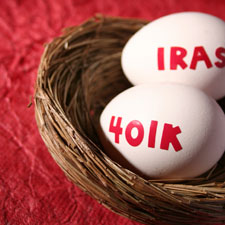Go Directly From A 401(k) To A Roth IRA
Published Monday, October 26, 2009 at: 7:00 AM EDT
 Shall we dance? In the past, if you rolled over funds from a 401(k) plan to a Roth IRA, you had to do a Texas two-step: 1) Transfer the cash from your 401(k) to a traditional IRA 2) Convert the traditional IRA into a Roth IRA, paying income tax on the amount you convert.
Shall we dance? In the past, if you rolled over funds from a 401(k) plan to a Roth IRA, you had to do a Texas two-step: 1) Transfer the cash from your 401(k) to a traditional IRA 2) Convert the traditional IRA into a Roth IRA, paying income tax on the amount you convert.
Now, thanks to a recent tax law change, the choreography is simpler, with just one step required. Furthermore, new IRS guidance gives 401(k) plan participants a slight edge on Roth conversions.
With a 401(k) plan, you accumulate funds on a pre-tax basis. You make annual salary deferrals (of up to $18,000 in 2017, plus $6,000 if you’re age 50 or older) that may be partially matched by contributions from your employer. Some plans also permit after-tax contributions. Plan investments compound tax free, but distributions from the 401(k) during retirement are taxed at ordinary income rates, currently as high as 39.6% plus the state tax obligation.
A Roth IRA works the other way around. Money goes in after taxes have already been paid, but qualified distributions, assuming the Roth has been around for at least five years, aren’t taxed. To qualify for a tax-free, penalty-free distribution, you have to be at least age 59½, though exceptions are made in the event of death or disability, or to pay expenses for a first-time homebuyer (up to a lifetime limit of $10,000).
You can convert a traditional IRA, built with pre-tax funds, into a Roth, regardless of the amount of your income. Previously, this was allowed only in a year in which your adjusted gross income was $100,000 or less. Beginning in 2010, however, the income ceiling was eliminated. That change is a provision of the Pension Protection Act of 2006, which also eliminated the need for a two-step move from a 401(k) to a Roth. (Some employers now offer an after-tax Roth 401(k) option, and these plans also can be rolled over directly to a Roth IRA.)
In a recent notice, the IRS sweetened this deal with the news that no tax is owed if you convert only non-deductible 401(k) contributions. In contrast, in any conversion from a traditional IRA to a Roth, all distributions must be based on the ratio of non-deductible contributions (ie., contributions that you can’t deduct from taxes) to the total value in all of your IRAs.
Suppose you have $200,000 in an IRA and $200,000 in a 401(k) to which you made $40,000 in non-deductible contributions to each. That five-to-one ratio means that if you convert $10,000 from the IRA to a Roth IRA, only $2,000 will be exempt from tax. But if you convert $10,000 in after-tax contributions from your 401(k) to a Roth, no tax will be owed.
Determining whether a Roth IRA conversion is right for you depends on a number of factors including your age and tax bracket. Though the Roth conversion dance is simpler now, you may still need a partner. We can help you determine whether a one-step rollover is right for your unique situation.
This article was written by a professional financial journalist for Preferred NY Financial Group,LLC and is not intended as legal or investment advice.
An individual retirement account (IRA) allows individuals to direct pretax incom, up to specific annual limits, toward retirements that can grow tax-deferred (no capital gains or dividend income is taxed). Individual taxpayers are allowed to contribute 100% of compensation up to a specified maximum dollar amount to their Tranditional IRA. Contributions to the Tranditional IRA may be tax-deductible depending on the taxpayer's income, tax-filling status and other factors. Taxed must be paid upon withdrawal of any deducted contributions plus earnings and on the earnings from your non-deducted contributions. Prior to age 59%, distributions may be taken for certain reasons without incurring a 10 percent penalty on earnings. None of the information in this document should be considered tax or legal advice. Please consult with your legal or tax advisor for more information concerning your individual situation.
Contributions to a Roth IRA are not tax deductible and these is no mandatory distribution age. All earnings and principal are tax free if rules and regulations are followed. Eligibility for a Roth account depends on income. Principal contributions can be withdrawn any time without penalty (subject to some minimal conditions).
© 2024 Advisor Products Inc. All Rights Reserved.
